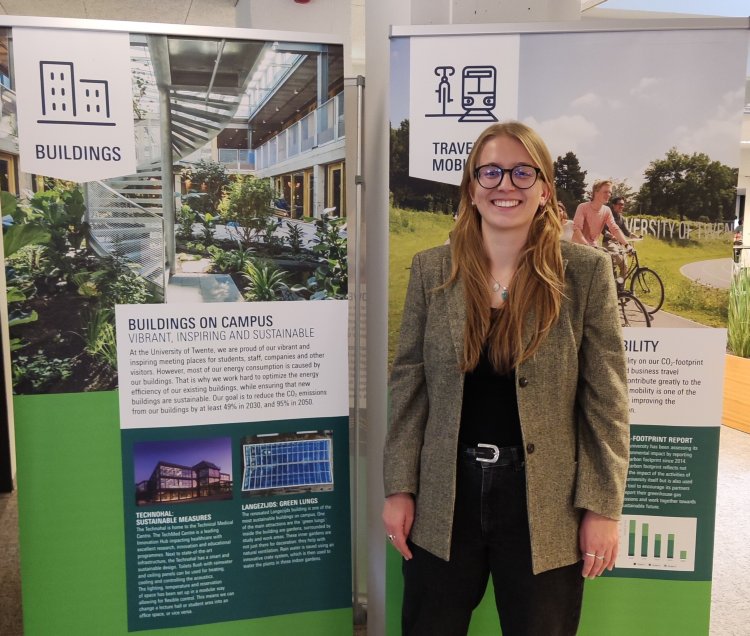From the Sustainability Walk to the Train Map and from the cycle to work day to the removal of disposable cups: over the years, UT has taken many measures to become a sustainable organization. But how has UT staff responded to these measures? Did the sustainability measures reach UT staff effectively? And have the measures contributed to staff changing their behaviour?
Ann Ottl, Master Psychology (Conflict, Risk and Safety) student at UT, looked into these questions during her internship with the SEE programme. Her study was conducted in a time span of 10 weeks and included interviews with 8 staff members from different faculties. It’s important to note that the results may not be representative of all UT staff. However, these interviews still provided Ann with various valuable insights.
Method of research: getting to know the staff
Ann explains: “We wanted to know what UT staff thinks about the sustainability measures that have been implemented at UT during the last few years. Did they increase their awareness about the topic? And more importantly, did these ways of communicating about sustainability measures contribute to staff changing their behaviour? For this study, I decided to get my information straight from the source; UT staff themselves.”
Ann conducted interviews, asking employees their opinions about an extensive list of significant sustainability measures, including:
The standard winter temperature of 19 degrees in UT buildings;
- The Train Map that promotes travel through Europe by train instead of by plane;
- The test drive day; employees were encouraged to book electric and hybrid rental cars for work trips instead of regular cars;
- The annual cycle to work day;
- The removal of disposable cups from the hot beverage machines;
- The Green Dish collaboration;
- The Sustainability Exhibition that travels through the UT buildings;
- The Sustainability Walk;
- The UT sustainability website
The results
Ann found out that sustainability is a lively topic at UT. Our staff were eager to answer all of her questions, which provided some valuable insights. Ann compiled a list of the most interesting ones:
- Staff mentioned that sustainable measures should be convenient and easy to implement. This underscores UT staff's willingness to help implement sustainability measures;
- Sustainability measures should be time-efficient. This is very important. Employees that are not yet participating in sustainability measures may do so for various reasons, like a lack of time. A non-judgmental approach may make these employees more willing to participate, instead of feeling judged and not willing to participate.
- Most people are influenced by conversations with people that are important to them. So, facilitating staff with up-to-date information and encouraging them to talk about sustainability with colleagues may be a way to build broader knowledge and awareness at UT.
- Interviewees suggested to invite all UT employees to share their ideas and opinions. They mentioned that many staff members think sustainability is important and they would like to contribute.
Staff suggestions
In addition to the insights mentioned above, staff also provided valuable suggestions. For example, suggestions on how to effectively inform staff about sustainability. One idea was to share information about sustainability measures as a standard agenda point, as well as presentations at staff meetings. Also mentioned; the idea to display information on places where UT staff meets regularly, like the O&O square and the coffee corners and pantries. They also suggested a physical activity to stimulate biodiversity. Currently, UT already provides staff and students with the tools to follow a (self)guided Sustainability Walk on campus.
Furthermore, UT staff considers transparency to be very important. The SEE programme already provides the UT community with Annual Reports and Annual Plans. These are always shared on the UT sustainability website, after extensive discussions at various meetings across UT such as the SEE working group, sounding board and SG, UCM, EB and UC.
It’s clear that Ann’s research provided UT with valuable insights that will help raise awareness and effectively implement our sustainability measures. As a final recommendation for future research, Ann suggested to include a larger sample and a random sample during the next round of interviews.

Sustainability at UT
Sustainability is an important priority area of Shaping2030, the University of Twente’s strategic plan. In addition to finding sustainable solutions for societal issues, the UT wants to set a good example of what it means to be a sustainable organisation. To reach this goal, the ambitions of Shaping2030 need to be put into practice. This article provides an an example of the many ways wide range of areas in which UT is working on across a wide range of areas toto become a sustainable organisation Would you like to find out more about sustainability at UT? Please go to: utwente.nl/sustainability.





